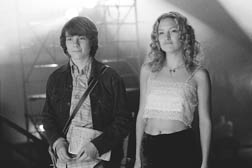Backstage Pass
'Almost Famous' on board a 70s rock tour
By Ellison Walcott

Cameron Crowe (Say Anything, Singles, and Jerry Maguire) has always had a fine ear for the marriage of music and film. (In real life, he's married to former Heart rocker, Nancy Wilson.) Indeed, all three films spawned popular soundtracks. No one will ever forget the Say Anything moment where John Cusack hoists a boom box playing Peter Gabriel's "In Your Eyes" at top volume to win back Ione Skye. It's almost enough to make one forgive Crowe for imposing a Springsteen ballad over queasy dialogue like "you had me at hello" in Jerry Maguire.
Crowe's latest film, Almost Famous, is a fictionalized depiction of his own coming of age story (he got his career start as a music writer).
And in this one, music, or rather the culture of music graduates from mood setting device to full-fledged plot. Actor Patrick Fugit portrays William Miller, a precocious teenager who writes rock criticism and befriends legendary critic Lester Bangs (Philip Seymour Hoffman), editor of Cream Magazine. (In real life, Bangs was Crowe's mentor.) The device of a naive narrator works seamlessly, affording the audience an insider's glimpse to the rock milieu that is at once disarmingly honest and sly.
Crowe endears the audience by painting William's mother, Elaine (effectively embodied by the talented Frances McDormand), as an eccentric college professor who knocks rock & roll and drugs. But in her strict, ethical stance, she's still a liberal at heart. When Bangs gives William an assignment to cover a Black Sabbath concert, Elaine drops him off and in a fit of parental panic, yells out to her son, "Don't do drugs." It's her way of telling him not to grow up too fast.
Of course the crowd around William bursts out laughing. Such "Oh Mommm!" moments are perfectly timed and keep William (and the audience) this side of fantasy.
William is continually denied backstage access until he befriends Russell Hammond (Billy Crudup) the lead guitarist of a backup band, the fictionalized Stillwater. Even though Russell calls all critics "the enemy," young William manages to get an invite to LA to interview him. In turn, by some prestidigitation, Rolling Stone calls up William and asks him what he has for them. When William says Stillwater, they ask him to tour with the band and offer to pay all expenses.
So the motherly-yet-trusting Elaine allows her 15-year old son to tour with a rock band, but only for four days. The caveat is that he must call twice a day and let her know where he is.
As luck and plot convention would have it, four days turns into a couple of months. William finds himself sharing the cross-country nomadic life of the up-and-coming musicians in a tour bus. With cherubic looks and a conversational confidence William has a backstage pass for the ego clashes, managerial politics, groupies, sex, drugs, and rock 'n' roll that populate this hedonistic landscape.
Throughout his travels, William phones not only his mother but also Bangs, and these moments of tutelage offer splendid comedic moments. Bangs, who is always home and listening to The Who, knows an opportunity when he hears one and becomes his mentor and acquisitive editor. He is, after all, the de facto competitor of Rolling Stone.
What would a movie like this be without a little romance thrown in? Crowe does not disappoint. William becomes achingly attached to Penny Lane (Kate Hudson, daughter of Goldie Hawn), Russell's road tour squeeze, from the very moment they meet. He treats her with more protectiveness and veneration than Russell could ever summon up. She, in turn appreciates his gallantry and youth. Both Penny and William mature in the arc of the film. Hudson's sweet Drew Barrymoresque looks glow on film like that of a leading actress. She will no doubt have many offers after this terrific supporting performance.
Fugit, in his debut performance, plays William with the flawless finesse of a precocious teenager. And while he doesn't command the camera, his role doesn't call for it. His performance is the backbone of a film that entertains with anecdotal wit and insightful charm.
While the 70s are what passes for retro and hip in this new millennium and pop culture is milking the styles and music for every red cent, Crowe's tale will not only captivate the baby boomers who lived through it, but also the Gen X and Yers, who are now knee deep into the garb and the nostalgia of an era they never experienced.
HOME | THIS ISSUE | ACE ARCHIVES